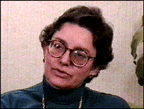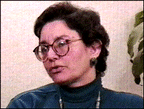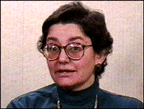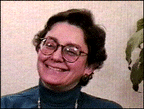![]() Listen
to Judi share a cancer experience in her own words. (456 K .au
file)
Listen
to Judi share a cancer experience in her own words. (456 K .au
file)

Judi, a family practitioner, was diagnosed with breast cancer at age 43. She and her partner, Anne White, were strongly affected by this diagnosis. It changed the way Judi worked with her patients, and affected her own priorities.

Regular mammograms did not detect a lump that Judi felt in her breast. She saw her doctor immediately. It took a week for her to get the test results, which confirmed that she had cancer.

Judi considered the treatments of mastectomy and lumpectomy for her kind of cancer. She chose a lumpectomy with chemotherapy and radiation.

The day Judi finished her radiation therapy, she flew to Michigan to start a new job. Although she was leaving her support group, she was beginning a new life, a clean slate.
Judi's Introduction: I had been in good health
I had been working for about four years as a family practice
physician at two community clinics in East Oakland. I had gotten a
master's in public health in Berkeley. And during that time I met
Anne White who has now been my partner for the last four years. I
basically had been in good health except for some minor problems with
asthma and allergies. I, of course, dealt with serious illnesses with
my patients and also with some family members and friends. But I,
myself, had really been in good health.
Judi's Introduction: I am forming a support group
As a lesbian, I do have some concerns different from women that
are not. I am trying to form a local cancer support group for
lesbians and their partners.
Judi's Introduction: There was cancer in my family
I had breast cancer on both sides of the family. My maternal aunt
had breast cancer about five years ago. It was found on a routine
mammogram. She had a mastectomy and is doing well. My paternal
grandmother also had a mastectomy. I believe both of them were
post-menopausal. My mother was thought perhaps to have a breast
cancer, but it was discovered she already had metastatic colon
cancer. And my mother's father had colon cancer also. And my father
died of a brain cancer.
Judi's Introduction: It's changed my work with patients
I think the experiences I've gone through as a result of it
certainly affect the way I talk to my patients about dealing with
cancer and dealing with chronic illnesses, and being more conscious
of the importance of family members and other caregivers, thinking
about their welfare also.
Judi's Introduction: It affects your priorities
Going through the diagnosis and treatment of a life threatening
disease I think changes one. And part of that is really looking at
your life, getting rid of some of the trivial stuff, learning to say
no to things that you don't want to do. And putting energy into
things that are important to you. Trying to take more control of
where you put your energy and looking again at the importance of
family and friends. And of course, my relationship with Anne is
really important and this has really affected her life, too.
Judi's Introduction: I still work hard, but...
I would say that I worked hard before having the cancer. I wasn't
as much a workaholic as some of my physician colleagues, but I worked
full time plus hospital time and some weekends. And so I am making
some conscious efforts now to see that my work does not consume all
of my time, and energy, and focus. And I think I'm a better physician
for that also.
![]() Return
to Judi's Outline
Return
to Judi's Outline
Judi's Diagnosis: Anne had a dream
One morning my partner, Anne, said that she'd had a dream the
night before that she had felt a lump in one of my breasts. And she
pointed and said right there. And I sort of as a joke, checked right
there and there was a lump. Maybe she had felt a lump and didn't
really remember it, or maybe it really was a dream to help us out.
It's hard to say.
Judi's Diagnosis: I had a fine needle aspiration
I was seeing a physician for an unrelated health problem, so she
did do a breast exam and did get me in right away for a mammogram and
also an appointment with the surgeon even without waiting for the
mammogram results. The surgeon on that first visit did do a fine
needle aspiration biopsy. That was without knowing yet the results of
the mammogram which had been two days before that appointment. And
then I had an appointment a week later to come back for the
results.
Judi's Diagnosis: I had to wait a week
I knew that nine out of ten come back benign, but of course, I was
nervous for that week. On the day that I was to get the result, I was
called early that morning. The doctor that I had the appointment with
had thrown us back and they'd canceled the appointments and they'd
make me an appointment the next week sometime. I said that no, that
wouldn't do, and I spent a good amount of that day making phone calls
to the surgery clinic saying I need to come in and be told the
results and I don't care if its another surgeon, or medical student,
or the receptionist. I want to know. And I did see another surgeon
right away who did then give me the diagnosis that it was definitely
malignant.
![]() Return
to Judi's Outline
Return
to Judi's Outline
Judi's Treatment: I went with lumpectomy
To me, far, far overriding concern about keeping a breast was
completely eliminating the cancer and preserving my life. The
literature clearly says that for certain types of tumors survival
results are just as good with lumpectomy and radiation as they are
with mastectomy. So I went with lumpectomy and radiation. If there
had been even a tiny bit of difference saying results are slightly
better with a mastectomy, I absolutely would have gone for mastectomy
without any question.
Judi's Treatment: I lost some mobility
After the axillary node dissection I didn't have full use of my
right hand and right arm. Initially there was some pain with
movement, and later on it was a matter of just not being able to do
everything. That has pretty much completely come back. And, for the
first ten days or so, there was a drain which we had to pump everyday
to get fluid out so fluid wouldn't accumulate. I went to the gym
about a week later and was on the way home and I felt a little pop
and I looked down and I was draining a lot of fluid all of a sudden.
The surgeon had said that a number of women do get what are called
seromas that are just an accumulation of fluid. I wasn't particularly
panicked, but I did call the surgeon and tell him and he said that's
fine.
Judi's Treatment: Watching the chemo was difficult
We talked to two oncologists and they both recommended standard
chemotherapy. I ended up getting the combination of two medications.
One of the hardest things for me was literally watching the
chemotherapy go into my vein. You know, watching this red stuff go in
and knowing that its literally poison. Although I sometimes drink
from styrofoam cups and eat red meat, I've tried to live a fairly
health lifestyle, and the idea of deliberately putting these
incredibly powerful toxic substances into my body - that was really
hard, emotionally. Even though intellectually I knew it was what I
had to do.
Judi's Treatment: Chemo makes your brain fuzzy
That leads to another very common side effect that isn't talked
about a lot, and that is that my brain was fuzzy. Something happens
and you are not thinking clearly. And that was another hard thing. So
I was very careful on the job to make sure that anything that was
questionable I had a colleague also look at.
Judi's Treatment: It makes the private public
I did lose my hair. That actually bothered me a lot more than I
thought it would. A lot of what's going on with the chemotherapy is
on the inside. This is very visible. When you start combing your hair
and big hunks of it comes out, its a real visible thing that makes
the private public. It's noticeable. A lot of women wear wigs. I
tried a couple of wigs on, but I just didn't feel comfortable in them
and so I wore scarves the whole time that I didn't have hair. But
it's still visible. When a woman wears scarves all the time
everywhere, people figure it out pretty quickly. And so I felt
conspicuous. I felt that something that I didn't necessarily want
everyone to know was out there.
Judi's Treatment: Anne went with me
My partner, Anne, went with me to the chemotherapy sessions. That
was really important. And we'd had several friends who had said that
if Anne couldn't go, they would go with me. The last chemotherapy was
on June 2, and I started the radiation treatments on June 20, and
that was five days a week for seven weeks. As much as they could,
they gave me appointments early in the day so that I could go on to
work after that.
Judi's Treatment: I missed one radiation session
The radiation treatments, each session just lasts about two
minutes. I did miss one day because I had arranged to take my board's
in family practice, which one has to do every seven years. I thought
about canceling, but I had paid my money and done a lot of paperwork,
and I decided to go ahead and do it. And I did pass. I didn't get the
highest possible mark.
![]() Return
to Judi's Outline
Return
to Judi's Outline
Judi's Recovery: Telling others was draining
Physically, and emotionally, it was difficult know that this was
certainly a disease that could result in my death at some point, and
adjusting to that thought. And it was also really exhausting telling
people that I cared about, because every time I told someone, they
were very upset and it took a lot of energy. And so there were some
people, some good friends, that I didn't tell, at least in that
initial period. Not that I was hiding anything, but just that it took
so much energy every time I went through the story with them.
Judi's Recovery: I was able to work flexibly
It really made a big difference that my workplace was very
understanding and accommodating to my changing schedule. Some of the
time I didn't work because I was literally too exhausted from the
treatments. And there were other times when you're most susceptible
to infections because of the effect of the chemotherapy on the immune
system. Even though I could have done work, the nature of my work
seeing sick people was such that it just wasn't wise for me to work,
so I had a very sort of peculiar pattern of working part-time and
then not working at all for the days that my immune system was the
most compromised.
Judi's Recovery: I joined Anne In Michigan
I finished radiation and that same day flew to Lansing, Michigan.
My partner, Anne, already had been there for three weeks and she was
about to start medical school. I very literally finished the
treatment and went on to a different life. So after arriving, I was
still quite fatigued for several more months, and I was taking
afternoon naps for quite a while. I didn't work the first three
weeks, and then I worked about three afternoons a week for about two
and a-half months, and then I started working basically a full-time
job.
Judi's Recovery: Leaving our support system
Moving on the day I finished treatment had its pluses and minuses.
It was very literally starting with a clean slate. It was very
difficult to leave our friends, and also Anne's family. Our support
system really was there. I have family members in the Chicago area
and in Iowa, and they've visited several times. But it was certainly
hard to move to a new place where you didn't know anyone. That's
always hard. And I did have days when I was really down, and I did
start going to a cancer support group. And of course, we have made
friends, but making good friends always takes a long time.
Judi's Recovery: Helping myself during recovery
I did see a therapist five or six times. That was somewhat
helpful. I am interested in imagery and visualization. I think
they're really helpful to some people, and I may still pursue some of
that. I have tried to eat healthy, although I must say I've sort of
gone back to the old ways. The other thing I did do after surgery and
during the other treatments was go through massage about every two
weeks, and I found that healing.
Judi's Recovery: After the stress and fatigue
Part of recovery is making the transition from that time when
you're just totally focused on the surgery, the chemotherapy, the
radiation, the fatigue. When that's finally over, and then you kind
of hit that point where physically, you're starting to feel better
and that's really encouraging. But emotionally or psychologically,
you're just totally drained. And sometimes I wanted to just stop and
not really do anything. I think I was really depressed for several
weeks. Partly that's a reaction to all this physical and emotional
stress, and part of it is looking ahead and saying, now I have to
deal with my life. Actually, there was one day there I was so
depressed I don't think I got out of bed all day and I called up all
the hospitals in the phone book to find a cancer support group that
was meeting that night and I drove 30 miles to get to one.
Judi's Recovery: My life is different now
It has always been more difficult for me to talk about my
feelings. I tend to avoid that, so I have tried to do a little better
at that. I think it might not look like it from the outside, but I
think my life is real different now than it was a year ago. I think I
value every day more. I think I try to look at all of minor actions
with colleagues, with patients, with Anne, my partner, with friends,
and sort of get the nugget of a real personal interaction out of each
one of them rather than just sort of getting through the day. There's
that shadow there that I think, you know, will always be there.
Knowing that I may not have another 30 or 40 years of life. It may
just be a short time, and what do I want to do with that time.
Judi's Recovery: I value the support group
The cancer support group is helpful to me in different ways. When
I first went, I just needed to be in a group of people that had gone
through this. I could talk to my friends and my family, but it was
different being with a group of people that had that shadow of fear
in their lives. Since I've been feeling better, going to the cancer
support group is partly to be with a group where they bring up things
that I'm thinking about. But as I said, I have a hard time talking
about feelings, so that way I can deal with some of these things
without having to bring it up myself in a conversation. They're very
courageous people. Some of the people in the group are dealing with
recurrences, and I'm seeing how they deal with it.
![]() Return
to Judi's Outline
Return
to Judi's Outline